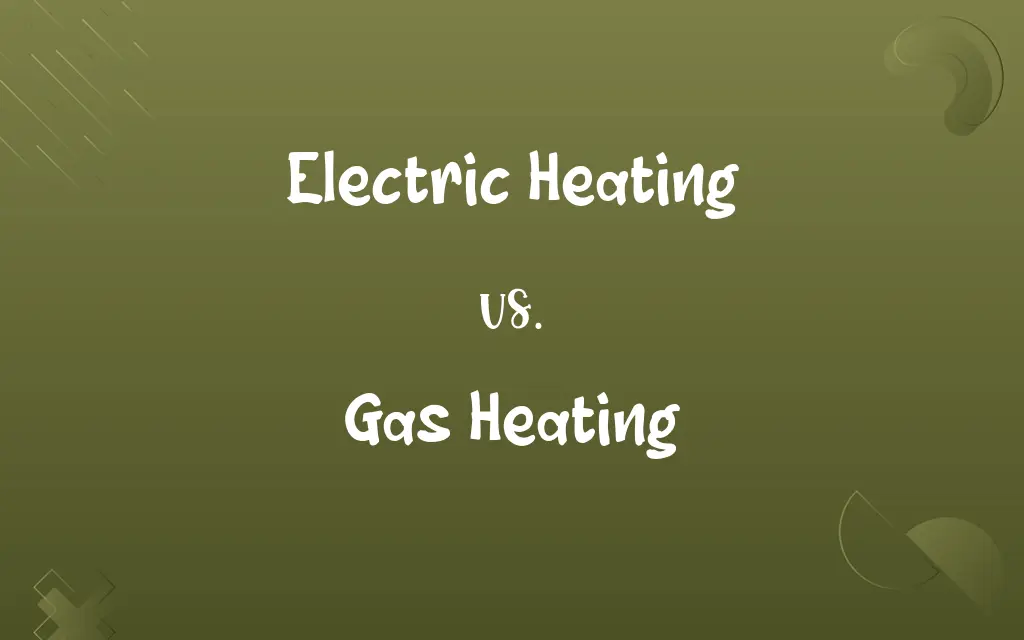Electric Heating vs. Gas Heating: Know the Difference
Electric heating refers to a heating system that operates using electricity as its power source. Gas heating, on the other hand, is a heating system that uses natural gas as its energy source.

Key Differences
Electric heating converts electrical energy into heat through devices like electric heaters. It's typically more expensive to operate than gas heating but offers easier installation and maintenance. Gas heating uses natural gas to produce heat, commonly through a furnace or boiler. Generally more cost-effective than electric heating, particularly in colder climates.
Electric heating systems have a near 100% efficiency rate as almost all electricity is converted into heat. Gas systems, while efficient, lose some energy through exhaust gases and are slightly less efficient.
Electric heating is considered more environmentally friendly, especially if sourced from renewable energy. Gas heating contributes to greenhouse gas emissions, though advancements are reducing its environmental footprint.
Comparison Chart
Energy Source
Electricity
Natural Gas
Cost Efficiency
Less cost-efficient
More cost-efficient
ADVERTISEMENT
Installation & Maintenance
Easier, less maintenance needed
More complex, regular maintenance
Heating Efficiency
High efficiency
Slightly less efficient
Environmental Impact
Lower, especially with renewables
Higher, due to emissions
Electric Heating and Gas Heating Definitions
Electric Heating
Electric heating involves using resistive elements to generate warmth.
Our new electric heating pad provides quick relief from muscle aches.
Gas Heating
Gas heating involves burning gas to heat air or water in a centralized system.
The building's gas heating was very effective during the cold snap.
ADVERTISEMENT
Electric Heating
Electric heating refers to the use of electricity to power radiators and heat pumps.
We installed electric heating because it's safer for the children.
Gas Heating
Gas heating is a method where gas fuels a furnace or boiler for heating.
Gas heating requires regular maintenance to ensure safety.
Electric Heating
Electric heating is the application of electric current to produce thermal energy.
Electric heating is a convenient option for small apartments.
Gas Heating
Gas heating refers to the use of propane or natural gas in heating appliances.
We switched to gas heating to reduce our electricity bills.
Electric Heating
Electric heating is a process where electrical energy is converted into heat.
The electric heating system kept the house warm all winter.
ADVERTISEMENT
Gas Heating
Gas heating uses natural gas combustion to provide heat.
Our home's gas heating system provides consistent warmth.
Electric Heating
Electric heating encompasses any heating system that relies on electrical power.
Electric heating systems are becoming more popular due to their efficiency.
Gas Heating
Gas heating comprises systems that utilize gas as a primary energy source for heat.
In our region, gas heating is preferred due to its cost-effectiveness.
Repeatedly Asked Queries
Can gas heating be environmentally friendly?
Modern gas heating systems are becoming more environmentally friendly, but they still emit greenhouse gases.
What is electric heating?
Electric heating is the conversion of electrical energy into heat, used in systems like electric furnaces and heat pumps.
Which is easier to install, electric or gas heating?
Electric heating systems are typically easier and less expensive to install than gas heating systems.
How does gas heating work?
Gas heating works by burning natural gas to produce heat, typically in a furnace or boiler system.
Is electric heating more expensive than gas heating?
Yes, electric heating is generally more expensive in terms of operational costs compared to gas heating.
Is gas heating quicker at warming a space?
Yes, gas heating systems are generally quicker at warming up a space compared to electric heating systems.
What maintenance does electric heating require?
Electric heating systems require minimal maintenance, mainly involving regular checks and occasional part replacements.
What type of maintenance does gas heating require?
Gas heating systems require annual inspections, cleaning of burners, and checks for leaks.
Can gas heating affect indoor air quality?
If not properly maintained, gas heating can affect indoor air quality due to emissions and inadequate ventilation.
How safe is gas heating?
Gas heating is safe when properly maintained, but it requires vigilance to prevent gas leaks and ensure proper ventilation.
Do electric heaters need a vent?
No, electric heaters do not require venting as they do not produce combustion gases.
Are there any risks with gas heating?
The primary risks with gas heating involve gas leaks and carbon monoxide emissions, which require proper installation and maintenance to mitigate.
Is gas heating better for large spaces?
Gas heating is often more effective and economical for heating larger spaces.
How long do electric heating systems last?
Electric heating systems typically have a lifespan of 15-20 years, depending on the type and usage.
Can electric heating be powered by renewable energy?
Yes, electric heating can be powered by renewable energy sources like solar or wind power.
What are the efficiency rates of electric heating?
Electric heating systems can achieve nearly 100% efficiency in converting electricity to heat.
Can I use electric heating in any room?
Yes, electric heating systems can be used in any room and are often suitable for small spaces.
Are there different types of electric heaters?
Yes, there are various types of electric heaters, including convection heaters, infrared heaters, and heat pumps.
Is it easy to switch from gas to electric heating?
Switching from gas to electric heating can be complex and may require significant modifications to the existing system.
Do both electric and gas heating systems have thermostats?
Yes, both electric and gas heating systems typically use thermostats for temperature control.
Share this page
Link for your blog / website
HTML
Link to share via messenger









































































